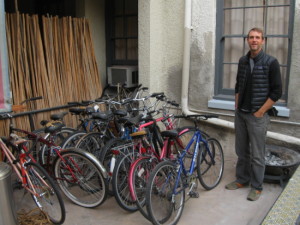
Editor’s note: This post was written by freelance writer Scott Lunt, who has an insatiable appetite for unusual experiences, good stories and cheap beer. He spends his cycling time piecing together impromptu loop rides and running occasional errands. Soaking in the Tucson sun since 1994 and pedaling its streets since 2003, he can be found two-wheeling around town on his Bacchetta Giro 20 recumbent.
When students show up for a semester of Earlham College’s Border Studies Program in Tucson, one thing they won’t have to worry about is transportation.
The private, Indiana-based college opened the program’s Tucson location in 2008. The site, currently located in the Historic Y complex on University Boulevard, brings in students from all over the country.
The program offers spring and fall semesters and includes the opportunity to stay with a local family. However, traveling between their temporary homes, classes and working internships is a challenge — especially for students who are used to living on campus.
“In the beginning we just gave them a bus pass, and that was really hard for them,” says Riley Merline, resident director of the Border Studies Program. “The bus will get you generally in the right area, but there’s a lot of time involved getting around when you are trying to go and then get back to the bus stop.”
The solution: Merline and his staff recommended a fleet of bicycles that students could use throughout the semester. In the spring of 2010 they started the fleet which now numbers 15 bikes of different varieties. Most of the bikes were either purchased or built through BICAS. Students simply pay a $30 deposit and they also get a helmet, light and lock.
“The main idea is to allow them more access to the city and to get around more efficiently,” says Merline. “As an afterthought, it also becomes a teaching experience as they think about transportation and what it’s like to get around in a city without a car.”
Merline says that students are also expected to help maintain their bike, including learning how to fix flats, adjust gears and more. There and Back Bicycles provides some periodic maintenance. He says they have probably spent about $3,000 for the bikes and accessories. They also let volunteers for No More Deaths use the bikes during one summer break.
Merline notes that most students are excited about getting a bike for the semester, although some are nervous because of the traffic or lack of riding experience. Some students bike 10 miles from their host’s home to class and back, and many end up getting into cycling by the end of the semester.
According to the program’s website, the Border Studies Program combines academic study, on-site learning, travel seminars and structured reflection to engage students in some of today’s most urgent social, economic and ecological matters. Students examine issues related to migration, human rights, globalization, food systems and the environment.
In addition to Merline, the Tucson faculty includes Assistant Director Katie Sharar and Program Assistant Jeff McWhorter.

[…] Bike fleet helps visiting students get around townTucson VeloHe spends his cycling time piecing together impromptu loop rides and running occasional errands. Soaking in the Tucson sun since 1994 and pedaling its streets since 2003, he can be found two-wheeling around town on his Bacchetta Giro 20 recumbent. … […]
Awesome, Riley! We are so proud of all you do to make us all more aware and make the world a better place.
Meg and Clark
As an Earlham graduate I was pleased to read this. Now I have a place to direct some of my alumni giving. Also not surprising to hear that they worked with There and Back. Steve reminded me of many of the people from my great little college. Buying a bike from him was a fun experience.